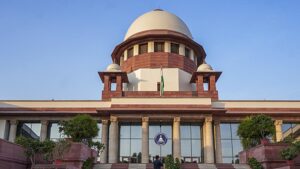Context

- The Supreme Court of India heard arguments on the Presidential Reference regarding the Governor’s powers under Article 200 relating to assent to Bills passed by State legislatures.
- Earlier, in J.B. Pardiwala case, a 3-month timeline was fixed for Governors to decide on Bills. The same applies to the President.
Key Issue
- Article 200 of the Constitution provides four options to a Governor when presented with a Bill:
- Give assent.
- Withhold assent.
- Return the Bill (if not a Money Bill) for reconsideration.
- Reserve the Bill for the President’s consideration.
- The controversy: Does the Governor have discretion in exercising these options, or must he act only on the aid and advice of the Council of Ministers under Article 163?
Judicial Principles
- Shamsher Singh v. State of Punjab (1974): Governor cannot act independently; must act on advice of the Council of Ministers.
- Nabam Rebia (2016): Reaffirmed that Governor is bound by ministerial advice in executive functions.
- Shamsher Singh & Nabam Rebia → Both highlight Governor’s limited discretion.
The Court’s Move
- Supreme Court fixed a 3-month time limit for the Governor/President to act on a Bill.
- The rationale: Long delays by Governors created a constitutional deadlock and undermined legislative supremacy.
Issue of ‘Discretion’
- The question: Can the Governor indefinitely withhold assent?
- Punchhi Commission & Sarkaria Commission → Governors must act as constitutional heads, not political actors.
- SC judgments like The State of Tamil Nadu v. The Governor of Tamil Nadu (2025) raised concerns about “sitting over” Bills, calling it unconstitutional.
Constitutional Significance
- Article 200 vs Article 201: Both do not prescribe a strict time limit, but SC interpreted constitutional silence to avoid abuse of power.
- Doctrine of Constitutional Morality invoked – authorities must uphold legislative intent, not stall it.
Why It Matters?
- Ensures legislative supremacy in a parliamentary democracy.
- Prevents Governors from stalling elected governments’ agendas.
- Strengthens cooperative federalism by curbing misuse of Governor’s office.
Way Forward
- Clearer constitutional or legislative amendment may be needed to codify timelines for assent.
- Governors must act as constitutional figureheads and not political agents.
- Judicial interventions should be exceptional, ensuring balance of power.




